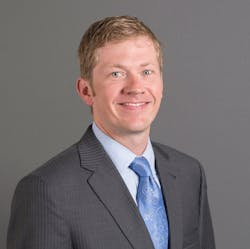Are You a Qualified Fire Investigator?
It seems that fire experts in both the public and private sector are rarely challenged on their qualifications when opining to the origin and cause of a fire or explosion; however, fire investigators must be knowledgeable about the relevant standards in order to testify—and be deemed credible with their findings.
Basic qualifications
National Fire Protection Association (NFPA) offers a standard that addresses this issue—NFPA 1033: Standards for Professional Qualifications of a Fire Investigator. Any expert must meet this standard if they are to opine as to the origin and cause of a fire loss. The current version of NFPA 1033 is the 2014 edition, as it follows a 5-year revision cycle. The document identifies the minimum professional qualifications for fire investigators.
Per section 1.3.7, the investigator shall have and maintain at a minimum an up-to-date basic knowledge of the following topics beyond the high school level:
(1) Fire science
(2) Fire chemistry
(3) Thermodynamics
(4) Thermometry
(5) Fire dynamics
(6) Explosion dynamics
(7) Computer fire modeling
(8) Fire investigation
(9) Fire analysis
(10) Fire investigation methodology
(11) Fire investigation technology
(12) Hazardous materials
(13) Failure analysis and analytical tools
(14) Fire protection systems
(15) Evidence documentation, collection, and preservation
(16) Electricity and electrical systems
And per section 1.3.8, the fire investigator shall remain current in the topics listed in 1.3.7 by attending formal education courses, workshops and seminars and/or through professional publications and journals.
Experts must not only maintain up-to-date knowledge of the 16 items listed in 1.3.7 of NFPA 1033, but they must also be able to articulate that they meet these requirements. Just because the expert has been in the fire field for several years does not mean they meet the bar that has been set for a science-based investigation of fire and explosion incidents.
As a fire investigator, you should keep detailed lists of training conducted and received. These trainings may consist of online courses, test burns conducted, training sessions conducted by colleagues, or in-person training courses. Further, you should update your curriculum vitae (CV) on a regular basis. If you do not have a CV, it is time to create one. Do not wait until it is requested for a legal proceeding.
NFPA 1033 addresses minimum job performance in in regards to Scene Examination, Documenting the Scene, Evidence Collection, Interview, Post-Incident Investigation, and Presentations, using requisite knowledge and requisite skills. Experts must possess all listed knowledge and skills. NFPA 1033 is not a standard intending to address how to conduct the fire investigation; it is only used to address the needed skills and knowledge an expert must maintain.
Further, NFPA 1033 states that fire investigators should be familiar with the technical information and procedural guidance presented in materials, such as NFPA 921: Guide for Fire and Explosion Investigations and The Fire Protection Handbook. This does not require reading these documents cover to cover; however, you should know how to navigate these books to find needed information. All investigators should have knowledge of the methodology presented in NFPA 921 in regards to origin and cause determination.
Daubert standard or Frye standard challenges to dismiss the expert’s testimony will focus on NFPA 1033 and NFPA 921, with the goal being to dismiss you, the expert, as testifying to the origin and cause of the fire. NFPA 921 is a guide, whereas 1033 is a standard. NFPA 921 focuses on the methodology investigators should follow to determine the origin and cause of fires and explosions. Experts should ensure that they follow the methodology of NFPA 921 and are very familiar with the entire document.
Some typical questions in a Daubert or Frye hearing:
- Are you familiar with NFPA 1033?
- Do you agree that NFPA 1033 represents the minimum qualifications for a fire investigator?
- Do you meet those qualifications?
- Referring to Section 1.3.7, do you possess knowledge of the 16 topics beyond a high school level?
- How do you meet these requirements?
- Are you familiar with NFPA 921?
- Do you follow NFPA 921?
- Are you familiar with The Fire Protection Handbook?
Be prepared
This is just a small sample of what to expect. Preparation is the key to success. Investigators must be familiar with 1033 and 921 and follow methodologies listed in 921. Prior to being involved in a Daubert or Frye hearing, investigators should work closely with their attorney to make sure they are prepared.
